I'm using Activator.CreateInstance to create objects by a type variable (unknown during run time):
static dynamic CreateFoo( Type t ) =>
Activator.CreateInstance( t );
Obviously, I do not yet properly understand how to use the dynamic type, because this is still just returning an object.
I need to be able to pass a collection to another call to Activator.CreateInstance where the type being created could be a List<T>:
var values = Enumerable.Range( 1, 50 ).Select(
I => CreateFoo( typeof( Foo ) ) ).ToArray( );
//This will explode.
var foobar = Activator.CreateInstance(
typeof( List<Foo> ), values );
When the above is called, it explodes with the following exception:
I get why it is doing that - there is no constructor for a list expecting an enumerable of objects when the list is defined with a type argument.
The problem is that I cannot cast the objects because I don't know the type at runtime. Activator.CreateInstance only ever seems to return an object, which is fine for the List<Foo> because I'll be setting them using Dependency Objects and Properties, so boxed objects are perfectly fine for them, but breaks everything when trying to create a list ( and, likely, anything else with a constructor expecting a type argument ).
What is the proper method for what I am trying to get done here?
In compliance with the Minimal, Complete and Verifiable Example requirements:
using System;
using System.Collections.Generic;
using System.Linq;
namespace MCVEConsole {
class Program {
static int Main( string[ ] args ) {
var values = Enumerable.Range( 1, 50 ).Select(
I => CreateFoo( typeof( Foo ) ) ).ToArray( );
//This will compile, but explode when run.
var foobar = Activator.CreateInstance(
typeof( List<Foo> ), values );
return 1;
}
static dynamic CreateFoo( Type t ) =>
Activator.CreateInstance( t );
}
class Foo {
public Foo( ) { }
}
}
